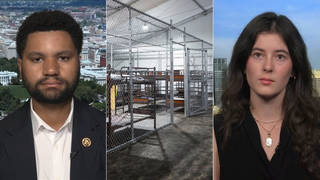
Guests
- Dan Aalberspsychologist and member of the dissident APA group called the Coalition for an Ethical Psychology
The American Psychological Association has approved a landmark measure banning members from taking part in interrogations of prisoners held in Guantanamo Bay. We speak to Dan Aalbers, member of the dissident APA group called the Coalition for an Ethical Psychology. [includes rush transcript]
Transcript
JUAN GONZALEZ: The American Psychological Association has approved a landmark measure banning members from taking part in interrogations of prisoners held in Guantanamo Bay, Iraq, Afghanistan and all of the secret CIA black sites. Nearly 60 percent of members voted in favor of the referendum in the largest turnout for an APA vote to date.
APA officials initially suggested they would delay implementing the referendum for up to a year. But in a surprise move, APA president Alan Kazdin recently wrote President Bush to inform him of the decision.
AMY GOODMAN: The letter says: “The effect of this new policy is to prohibit psychologists from any involvement in interrogations or any other operational procedures at detention sites that are in violation of the U.S. Constitution or international law…In such unlawful detention settings, persons are deprived of basic human rights and legal protections, including the right to independent judicial review of their detention…There have been many reports, from credible sources, of torture and cruel, inhuman, or degrading treatment of detainees during your term in office. Therefore, the American Psychological Association strongly calls on you and your administration to safeguard the physical and psychological welfare and human rights of individuals incarcerated by the U.S. government in such detention centers and to investigate their treatment to ensure that the highest ethical standards are being upheld.”
The referendum was spearheaded by a dissident APA group called the Coalition for an Ethical Psychology. We’re joined right now by a member of the group who helped draft the referendum text. Dan Aalbers joins us now from Reno, Nevada.
Welcome to Democracy Now! Dan Aalbers, talk about how this referendum was finally passed. There has been this growing dissident movement within the world’s largest association of psychologists, the American Psychological Association. How did you do it?
DAN AALBERS: Well, this is really a community effort. I think that there was a lot of dissatisfaction with APA policy up until this point. And a group of us came together, Psychologists for an Ethical APA, Withhold APA Dues, and looked into the APA bylaws to find a way to bring this issue directly to the membership. And so, I joined with Brad Olson, with Ruth Fallenbaum — two other dissident psychologists — and we just used old-fashioned networking. We spread it around, and I was really amazed to see the way this spread spontaneously. We did not ask a single group to endorse this referendum, but day after day, I would open my email, and another group had come in spontaneously, because people had been working autonomously in their own groups to bring this referendum forward. And it worked.
AMY GOODMAN: Dan Aalbers, I wanted to turn for a minute back a year ago to that town-hall meeting in August of 2007, when hundreds of APA members gathered to discuss the issue of prisoner interrogations. This town-hall meeting came right after the APA’s Council of Representatives voted to reject the kind of ban that APA members have just approved by the referendum. You were among the outraged APA members to speak out.
DAN AALBERS: My name is Dan Aalbers, and I am just another psychologist who thinks that the moral issue of our time has landed at our doorstep. I wanted to say just a few things. One, I think that there has not been today, or in these last number of years, enough discussion about the difference between the culture of science and the culture of an intelligence community. Scientists are committed to openness. Ultimately, what keeps us ethical is not our ethical code, is not our internal review boards, but it is that we publish our research, we present things at conferences, and ultimately, the last test on whether or not we have been ethical or not is public scrutiny. This is very different from an intelligence organization, which tends to want to control information. And there are these basic incompatibilities, I think, we have not addressed.
The second point I want to make is about this moratorium that did not pass. We have made an enormous mistake, and I think it’s — not only did we do the wrong thing morally, we did not act in our best interests. We are now standing against the American Psychiatric Association, the American Medical Association, the British Psychological Society, numerous human rights organizations, the UN, the Council of Europe, and this detention and interrogation policy is going to go down. And once it does go down, we will find that we have secured the best cabin on the Titanic. Thank you.
NANCY WECKER: Hi, my name is Nancy Wecker. I’m in private practice in San Francisco. I just want to propose a conflict that we have. It’s like we’re embedded in the military, you know, like the journalists who are embedded in the war. That’s our problem. Most of our internships are all in the military, DoD or mostly the VA. So I think we have this problem with ethics are really highfalutin — you know, it’s hard for us to imagine people being tortured, for a lot of us. And then we have our affiliation and our loyalty. So, these are in conflict, and I think people couldn’t imagine, you know, withdrawing from our responsibilities and our teamwork with these people in the military, because of some highfalutin kind of ideals.
AMY GOODMAN: Dissenting psychologists, over a year ago, after the referendum, which wasn’t a referendum then — resolution, was voted down to prohibit psychologists participation in these interrogations. Actually, at that time, the APA leadership tried to throw Democracy Now! out of the open town-hall meeting, saying they didn’t want us to record anymore, but the psychologists fought back, and we were able to film, which is why we’re able to bring this to you.
Dan Aalbers, now the new president of the American Psychological Association has, to your surprise, said this will be instituted now.
DAN AALBERS: And I think that’s a very significant change in policy, that now we have an opportunity to change course. You know, as I said a year ago, that this ship is going to go down. And I really think that psychology has an opportunity to become part of the cleanup crew to stop the abuses. When we have been participating, we have been collaborating, we have been helping Guantanamo stay afloat. Now that this detention and interrogation program is going down, we now have an opportunity to be on the right side of this issue. It’s what the members want. I think you heard it in that tape of the hall. That is the voice of the membership. We have close to 60 percent of members voting for this. And I’m really happy to see that President Kazdin understands that a good leader is led from below.
JUAN GONZALEZ: And, Dan Aalbers, what’s the practical effect of the ban now? Do members have to automatically stop, or is this an individual decision on their part still? And how will it actually work out in practice?
DAN AALBERS: That’s something that remains to be seen. Again, we’re very inspired by this letter. We hope that the APA is going to go forward with a full implementation. And full implementation means putting psychologists on the side of the detainees and not the detainers. And that will mean removing psychologists from these places that operate outside of and in violation of US and international law. And so, practically, it means psychologists out as soon as possible.
AMY GOODMAN: You know, it’s interesting. This has not gotten a tremendous amount of attention outside the APA. Ironically, the New York Times had quite a significant piece on this, but it was the day they made an error, and they printed one page of the New York Times on two separate pages, and that second page covered up the article about this APA dissident victory. And they had a little correction in the New York Times that said go to our website if you want to see that article. They had that days later.
This is — this vote is the largest vote on any referendum in APA history. How did you figure out — after the resolution was voted down, after you saw the leadership was adamantly against what you were doing, how did you figure out this approach, to go with a referendum that would come from the grassroots up?
DAN AALBERS: A psychologist by the name of Dan Denuit [phon.] at the University of Oregon suggested this. And I just took his suggestion to use as part of the association bylaws, which had never been used before. I contacted the recording secretary. And it really — it really snowballed from there. So, the APA said — allowed us to use an electronic petition, and from there, it was really grassroots organization. So it started with Dan Denuit [phon.], and he got the ball rolling, and we took it from there.
AMY GOODMAN: And finally, how does it work? I mean, this is not exactly like a law passed by Congress. So, you pass this referendum. The president says it will be adopted immediately, of the American Psychological Association. He sends a letter to Gates and to President Bush. What does it mean for a member of the American Psychological Association now, if they’re at Guantanamo?
DAN AALBERS: Well, one thing, I think, that the APA, if it wants to show that it really understands this to be the primary issue of the day, that this is the — this is the moral issue of our time, is going to see that the White House, the CIA, the Department of Defense, complies with APA policy and brings these psychologists out and brings independent psychologists in. We want to have independent psychologists working inside of Guantanamo and the black sites to repair the damage. We know that Guantanamo, the black sites are systems that are designed to break a person down. We also know that psychologists can do something to repair the damage. And this referendum gets the psychologists that are working for the detainers out, and we want to ensure that the APA fights to get psychologists who are working for the detainees in, to offer them therapy, to record what has been done, and we want a full and transparent process. And we’re waiting to see what the APA will do to fully implement this.
AMY GOODMAN: Dan Aalbers, I want to thank you for being with us, member of the Coalition for an Ethical Psychology, dissident APA group. He co-authored the APA referendum banning involvement in prisoner interrogations that has just won in the largest vote in APA history for such a referendum. This is Democracy Now!, democracynow.org, the War and Peace Report. We’ll link to your website on our website at democracynow.org.













Media Options